
COTO CONTRACT MANUFACTURING (CCM) – WHO WE ARE
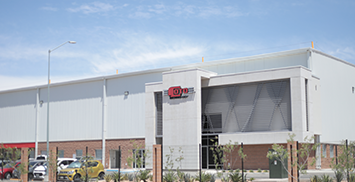
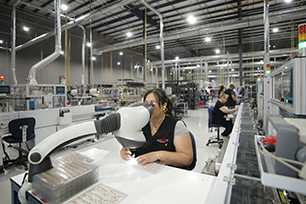
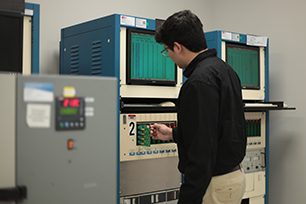
OUR PARENT COMPANY – COTO TECHNOLOGY
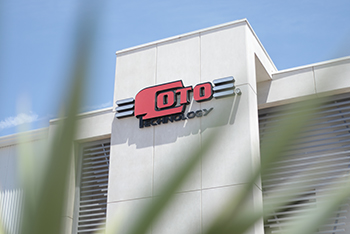
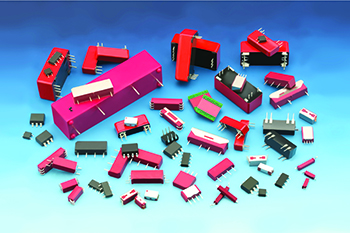
TOTAL QUALITY MANAGEMENT

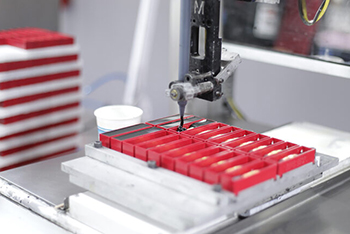
> ISO 9001:2015
> RoHS Certificate of Compliance
> REACH Declaration
> Conflict Minerals Declaration
> Mexico Privacy Notice

More advanced tests include Paschen voltage breakdown to detect switch seal breakdown, and an automated tester designed to determine the contact welding resistance of reed switches. Coto is also equipped with high-end digital oscilloscopes and network analyzers, to meet the increasing demand for relays with RF bandpass above 10 GHz.
Coto also maintains a highly-capable failure analysis laboratory that performs electrical testing, cross sectioning, x-ray, chemical and microscopic inspection, helium leak test and element analysis.
Finally, Coto has a robust organizational structure with a highly skilled and qualified staff in all job functions. The company continuously promotes the development of its employees through well-defined training and certification programs.
BENEFITS OF MANUFACTURING IN MEXICALI

> Integrated Transportation and Communication Infrastructure: A fully developed transportation network air, land, and sea, alongside robust communication systems including telephone, fax, satellite, microwave, and direct computer networking.
> Reliable Logistics Support: Government and private transportation services ensure efficient movement of goods and services between suppliers and clients.
> Strategic Cross-Border Connectivity: Fast and efficient transportation of imports and exports between the United States and Mexico.
> Higher Education and Technical Training: Mexicali is home to six universities and twelve technical trade schools, with the largest school enrolling over 20,000 students across various disciplines.
> Collaboration Between Industry and Education: Universities and technical institutes partner with companies to develop specialized training programs and projects that align with industry needs.
> Diverse and Skilled Workforce: Approximately 180,000 workers are available, ranging from general labor to highly specialized professionals.
> State-Led Workforce Development: The government supports ongoing training and education programs to continually raise workforce standards.
> School-Industry Partnership Programs: Initiatives that help align labor force development with the evolving requirements of the industrial sector.
> Support for Employer Training: Through the National Employment Service, companies can receive financial support to offset the costs of customized employee training.
COTO CONTRACT MANUFACTURING (CCM) – WHO WE ARE



Located just 2.5 hours from San Diego, this site now serves as a central hub for engineering, manufacturing, assembly, and testing of many Coto products.
Mexicali is home to six universities and 12 technical trade schools. Inhabited by nearly one million people, there are 180,000 workers with skills ranging from basic manpower to highly specialized professionals.
OUR PARENT COMPANY – COTO TECHNOLOGY


TOTAL QUALITY MANAGEMENT


Coto also maintains a highly-capable failure analysis laboratory that performs electrical testing, cross sectioning, x-ray, chemical and microscopic inspection, helium leak test and element analysis.
> ISO 9001:2008
> RoHS Certificate of Compliance
> REACH Declaration
> Conflict Minerals Declaration
> Mexico Privacy Notice

Coto is an ISO-9001 certified company. Our facilities comply with ESD and all pertinent safety and environmental regulations. Our product portfolio meets RoHS international standard and product safety agency approvals from UL and CSA. Additionally, Coto is dedicated to promoting the principles of Lean Six Sigma - a disciplined, data-driven approach and methodology for eliminating defects and systematically removing waste.
Finally, Coto has a robust organizational structure with a highly skilled and qualified staff in all job functions. The company continuously promotes the development of its employees through well-defined training and certification programs.
BENEFITS OF MANUFACTURING IN MEXICALI

> Integrated Transportation and Communication Infrastructure: A fully developed transportation network air, land, and sea, alongside robust communication systems including telephone, fax, satellite, microwave, and direct computer networking.
> Reliable Logistics Support: Government and private transportation services ensure efficient movement of goods and services between suppliers and clients.
> Strategic Cross-Border Connectivity: Fast and efficient transportation of imports and exports between the United States and Mexico.
> Higher Education and Technical Training: Mexicali is home to six universities and twelve technical trade schools, with the largest school enrolling over 20,000 students across various disciplines.
> Collaboration Between Industry and Education: Universities and technical institutes partner with companies to develop specialized training programs and projects that align with industry needs.
> Diverse and Skilled Workforce: Approximately 180,000 workers are available, ranging from general labor to highly specialized professionals.
> State-Led Workforce Development: The government supports ongoing training and education programs to continually raise workforce standards.
> School-Industry Partnership Programs: Initiatives that help align labor force development with the evolving requirements of the industrial sector.
> Support for Employer Training: Through the National Employment Service, companies can receive financial support to offset the costs of customized employee training.
The city offers a strong infrastructure and support system that contributes to its reputation as a reliable industrial hub.
COTO CONTRACT MANUFACTURING (CCM) – WHO WE ARE



OUR PARENT COMPANY – COTO TECHNOLOGY

Today, Coto is a leading manufacturer of small signal switching products sold into the Automatic Test Equipment, Data Acquisition, Instrumentation, Process Control, Telecommunications, Medical and Security markets. Non-standard package sizes and pinouts, custom coil and shielding designs, and multi-pole configurations are common variables.

TOTAL QUALITY MANAGEMENT


> ISO 9001:2008
> RoHS Certificate of Compliance
> REACH Declaration
> Conflict Minerals Declaration
> Mexico Privacy Notice

Coto also maintains a highly-capable failure analysis laboratory that performs electrical testing, cross sectioning, x-ray, chemical and microscopic inspection, helium leak test and element analysis.
Finally, Coto has a robust organizational structure with a highly skilled and qualified staff in all job functions. The company continuously promotes the development of its employees through well-defined training and certification programs.
Coto is an ISO-9001 certified company. Our facilities comply with ESD and all pertinent safety and environmental regulations. Our product portfolio meets RoHS international standard and product safety agency approvals from UL and CSA. Additionally, Coto is dedicated to promoting the principles of Lean Six Sigma - a disciplined, data-driven approach and methodology for eliminating defects and systematically removing waste.
BENEFITS OF MANUFACTURING IN MEXICALI

> Integrated Transportation and Communication Infrastructure: A fully developed transportation network air, land, and sea, alongside robust communication systems including telephone, fax, satellite, microwave, and direct computer networking.
> Reliable Logistics Support: Government and private transportation services ensure efficient movement of goods and services between suppliers and clients.
> Strategic Cross-Border Connectivity: Fast and efficient transportation of imports and exports between the United States and Mexico.
> Higher Education and Technical Training: Mexicali is home to six universities and twelve technical trade schools, with the largest school enrolling over 20,000 students across various disciplines.
> Collaboration Between Industry and Education: Universities and technical institutes partner with companies to develop specialized training programs and projects that align with industry needs.
> Diverse and Skilled Workforce: Approximately 180,000 workers are available, ranging from general labor to highly specialized professionals.
> State-Led Workforce Development: The government supports ongoing training and education programs to continually raise workforce standards.
> School-Industry Partnership Programs: Initiatives that help align labor force development with the evolving requirements of the industrial sector.
> Support for Employer Training: Through the National Employment Service, companies can receive financial support to offset the costs of customized employee training.
CCM - WHO WE ARE



Now, through Coto Contract Manufacturing (CCM) – a division dedicated to strategic partnerships – Coto leverages its robust infrastructure, experienced engineering team, extensive product development expertise, and highly skilled workforce to deliver a wide range of precision hand and automated assembly services.
OUR PARENT COMPANY – COTO TECHNOLOGY

Today, Coto is a leading manufacturer of small signal switching products sold into the Automatic Test Equipment, Data Acquisition, Instrumentation, Process Control, Telecommunications, Medical and Security markets. Non-standard package sizes and pinouts, custom coil and shielding designs, and multi-pole configurations are common variables.

TOTAL QUALITY MANAGEMENT

> ISO 9001:2008
> RoHS Certificate of Compliance
> REACH Declaration
> Conflict Minerals Declaration
> Mexico Privacy Notice
Coto operates in an environment of structured problem solving, using cross-functional teams for product development planning and continuous improvement processes. These team efforts combined with active customer involvement ensure product designs that meet or exceed customer needs. Continuous production monitoring is accomplished through the use of Statistical Process Control (SPC) and other quality practices such as FMEA’s (failure mode and effect analysis), PPAP’s (production part approval process) and zero acceptance sampling are used for analysis and monitoring of key parameters. Coto’s quality philosophy and discipline provide the building blocks for its reputation as the world leader in quality small signal switching products.
Throughout the manufacture of Coto switches, a zero failure acceptance testing system is used for each critical process step. The mechanical and chemical properties of the switches after process stages such as plating, diffusion, sputtering, sealing and forming are inspected to ensure conformance to required specifications. Prior to shipment, 100% of the switches produced are electrically checked for AT value and contact resistance.
Our life testing laboratories can cycle relays or switches while applying a wide range of load voltages and currents. Relays are concurrently tested up to one billion cycles. The effects of surge currents from reactive loads can be included. Failure data is analyzed using Weibull techniques to allow accurate prediction of MCBF (mean cycles before failure), and the confidence limits that apply. Coto also has a sweep frequency life tester designed to probe reed switch blade resonance and its effect on long term contact resistance.

Coto also maintains a highly-capable failure analysis laboratory that performs electrical testing, cross sectioning, x-ray, chemical and microscopic inspection, helium leak test and element analysis.
Finally, Coto has a robust organizational structure with a highly skilled and qualified staff in all job functions. The company continuously promotes the development of its employees through well-defined training and certification programs.
Coto is an ISO-9001 certified company. Our facilities comply with ESD and all pertinent safety and environmental regulations. Our product portfolio meets RoHS international standard and product safety agency approvals from UL and CSA. Additionally, Coto is dedicated to promoting the principles of Lean Six Sigma - a disciplined, data-driven approach and methodology for eliminating defects and systematically removing waste.

BENEFITS OF MANUFACTURING IN MEXICALI

> Integrated Transportation and Communication Infrastructure: A fully developed transportation network air, land, and sea, alongside robust communication systems including telephone, fax, satellite, microwave, and direct computer networking.
> Reliable Logistics Support: Government and private transportation services ensure efficient movement of goods and services between suppliers and clients.
> Strategic Cross-Border Connectivity: Fast and efficient transportation of imports and exports between the United States and Mexico.
> Higher Education and Technical Training: Mexicali is home to six universities and twelve technical trade schools, with the largest school enrolling over 20,000 students across various disciplines.
> Collaboration Between Industry and Education: Universities and technical institutes partner with companies to develop specialized training programs and projects that align with industry needs.
> Diverse and Skilled Workforce: Approximately 180,000 workers are available, ranging from general labor to highly specialized professionals.
> State-Led Workforce Development: The government supports ongoing training and education programs to continually raise workforce standards.
> School-Industry Partnership Programs: Initiatives that help align labor force development with the evolving requirements of the industrial sector.
> Support for Employer Training: Through the National Employment Service, companies can receive financial support to offset the costs of customized employee training.


